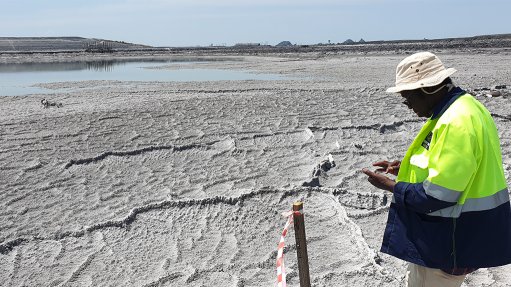
Gypsum stacks at Phalaborwa project
London-listed Rainbow Rare Earths has signed a share placing and royalty agreement with fellow-listed Ecora Resources, raising $10-million for Rainbow to proceed with studies at the Phalaborwa rare earths project.
Rainbow says the agreement endorses its 85%-owned Phalaborwa project, in South Africa’s Limpopo province, as a stand-out opportunity. The project is expected to be one of the highest-margin rare earth projects globally.
Rainbow will use the proceeds to complete a definitive feasibility study (DFS) on the project during the first half of 2025, as well as for working capital through to June 2025.
Notably, the funding agreement is largely non-dilutive to Rainbow shareholders compared with conventional equity funding.
The company also explains that this royalty is the only revenue royalty payable for Phalaborwa owing to the unique nature of the project, which does not normally attract royalties payable for hard-rock mining projects.
The agreement entails Ecora buying a 0.85% gross revenue royalty on future rare earths production from Phalaborwa, plus any other saleable products, for a cash consideration of $8.5-million.
Rainbow has also agreed to issue about 10.4-million new ordinary shares to Ecora, to raise an additional $1.5-million.
The company warns that the royalty rate will increase to 0.95% if production does not occur before October 1, 2027, and further to 1.1% if production does not occur before July 1, 2028.
“We are delighted to have concluded this royalty agreement with Ecora which allows us to take the Phalaborwa project all the way through to a completed DFS, without causing any significant dilution to shareholders.
“This investment confirms Phalaborwa’s status as a strategic and near-term source of all four of the magnet rare earths separated oxides so critical to the green energy transition,” says Rainbow CEO George Bennett.
He adds that the agreement is also a validation of the robust economics of the project, with its comparatively low capital and operating costs giving it resilience against rare earth pricing fluctuations.
Ecora CEO Marc Bishop states that the Phalaborwa project is one of the lowest-cost prospective projects of rare earths outside of China and that production will be primarily weighted to rare earth elements that are essential in the production of permanent magnets.
In turn, permanent magnets are key components in wind turbines and electric vehicle motors.
“The transaction provides Ecora with a counter-cyclical entry point to diversify its commodity exposure to include rare earth elements, whose end markets are forecast to see sustained demand growth over coming decades,” Bishop says.
Meanwhile, a key component of the DFS is the operation of a pilot plant to confirm and optimise the operating parameters for the unique flowsheet developed to deliver separated rare earth oxides from phosphogypsum stacks at Phalaborwa.
Rainbow plans to release an interim report in the second half of this year to update the economics of the project and to reflect the optimisations having been delivered from pilot testwork campaigns already under way.
Following completion of a DFS, Rainbow expects to make a final investment decision during the first half of 2027.
So far, the project is expected to produce 1 750 t/y of neodymium and praseodymium oxide, as well as 60 t/y of dysprosium oxide and 20 t/y of terbium oxide.